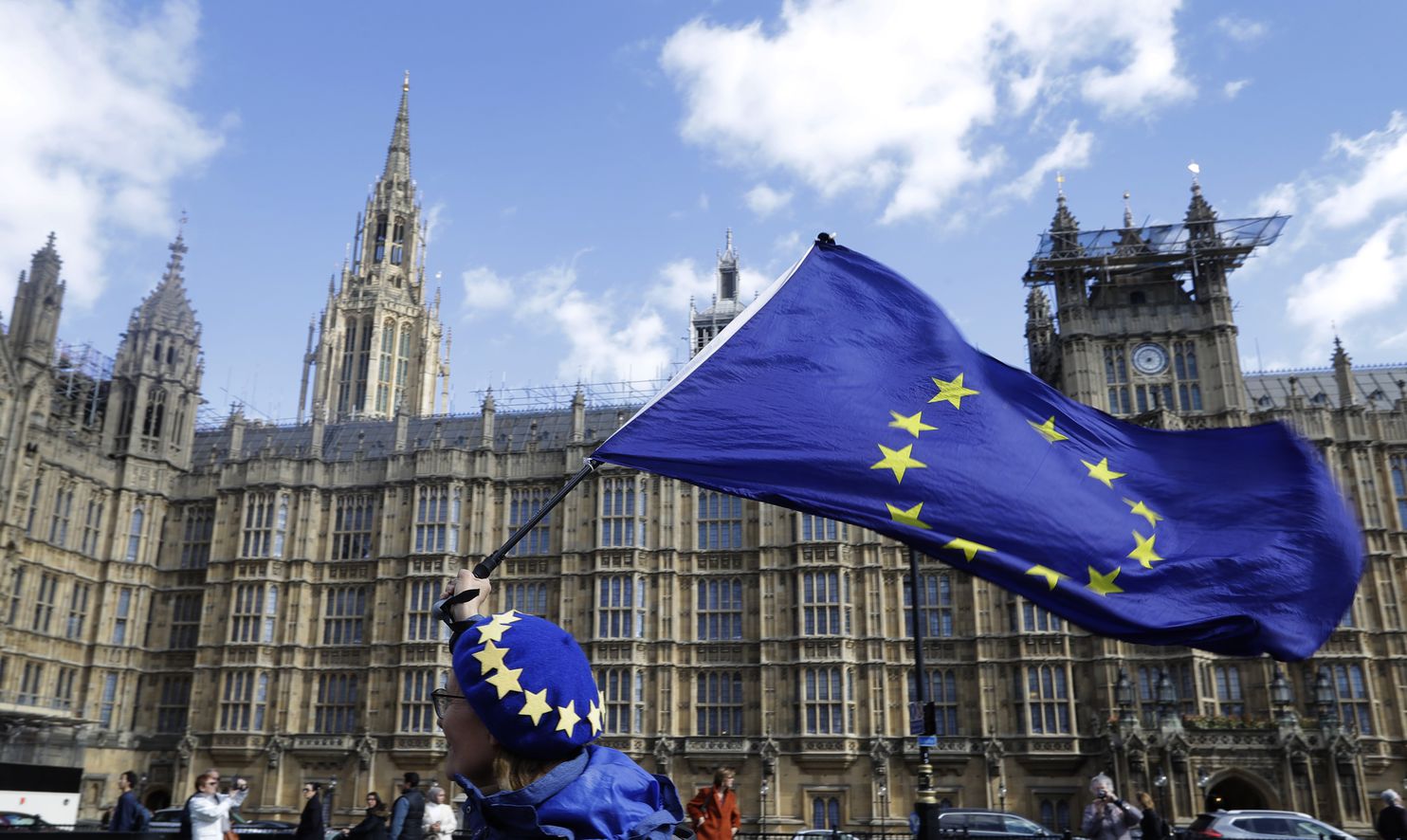 An anti-Brexit campaigner shows her support for Europe with a European Union flag outside Parliament in London on Monday. (Kirsty Wigglesworth/AP) By Lara Spirit March 25, 2019
An anti-Brexit campaigner shows her support for Europe with a European Union flag outside Parliament in London on Monday. (Kirsty Wigglesworth/AP) By Lara Spirit March 25, 2019
Lara Spirit is co-president of Our Future Our Choice, a group of young people campaigning for a second referendum on Brexit.
LONDON — There were two very different stories in British politics over the weekend. The first was of a million people marching in one of the largest demonstrations in British history to demand a people’s vote on Brexit. The second story was about a much smaller gathering: About a dozen Conservative party leaders and Brexiteers — all male, white, middle-aged and elite — made their way to Prime Minister Theresa May’s sprawling country estate in yet another desperate attempt to save her premiership.
The will of the people was visible on the streets: We are united against Britain’s needless act of self-harm. The million who marched were from every corner of the country, from all backgrounds, from every political party and from none. They were led by young people, who in 2016 voted overwhelmingly against Brexit and who will disproportionately bear the cost of this doomed project.
The contrast between the protest march and the gathering at Chequers, May’s estate, could not be starker. As we took to the streets to stand up against a Brexit plan that would leave us poorer and with less control than our current European Union deal, those with the least to lose from this national humiliation were sitting down to save their party, rather than their country. It speaks to the fundamental truth of the Brexit saga from the very beginning: Brexit was always an ideological fantasy fostered by Britain’s elite.
May now needs to get her Brexit deal passed by April 12, or Britain will be forced to leave the E.U. with no deal in place, which would cause travel, trade and diplomatic chaos. If she is successful, Britain will leave the European Union on May 22.
But it is highly unlikely that she will be successful. Members of Parliament from both the Conservative and Labour parties will rightly continue to reject her deal — a deal that the vast majority of the country opposes. Those MPs pushing for a new referendum are right to champion the only democratic route out of an intractable parliamentary gridlock, and they are likely to continue to do so in growing numbers.
The million-strong march was a clear signal of what the country thinks of May’s Brexit deal. The government has failed on every level to craft a deal even vaguely resembling the promises made by Brexit’s chief architects. We were told that Brexit would save us money that could then go toward our National Health Service — but that takes into account neither the inevitable economic losses nor the spending that the government will have to take on after Brexit. By the government’s own estimations, Brexit will cost the country £100 billion ($132 billion) a year by 2030.
We were promised more trade with the rest of the world, but only a fraction of our existing trade deals are ready to roll over. And we were promised more control over our laws, but instead, we’ll be following E.U. rules and regulations in a transition period without any say over them.
Young people are outraged by the abject failure of their representatives, and they will not forget a government bereft of leadership and an opposition that failed to hold those leaders to account. Our will is very clear. We know that any form of Brexit would damage our future. We know this government cares little for us, and we are not prepared to sit by while the Conservative Party struggles to keep itself alive. We also know that should May’s deal somehow pass, this is only the end of the beginning. With decades more uncertainty and incivility to come, it’ll be young people who are forced to make sense of something that makes no sense for our country.
Boris Johnson, one of the most recalcitrant of the Conservatives, has had three meetings with May in just one week. While Britain’s young people are shut out of the political process entirely, May seems to pay more attention to a former minister who regularly derides her plans, including on the front page of a national newspaper, than for the masses who march peacefully for a different future.
May must recognize that the million-strong march is a clearer litmus test for what the country thinks than the select few who visited her on Sunday. Democracy is not located solely in the 16th-century walls of Chequers but in the masses who decry this mess. Politicians still have the chance to recognize that the only way out lies with these people. They must take that chance while they still can.
This column was produced in collaboration with the WorldPost, a publication of the Berggruen Institute.
Read more:
Anne Applebaum: Theresa May isn’t the adult in the room. She’s part of the problem.
Nick Cohen: The quest for Brexit has killed Britain
Fareed Zakaria: Brexit will mark the end of Britain’s role as a great power
Anne Applebaum: The more we learn about Brexit, the more crooked it looks





